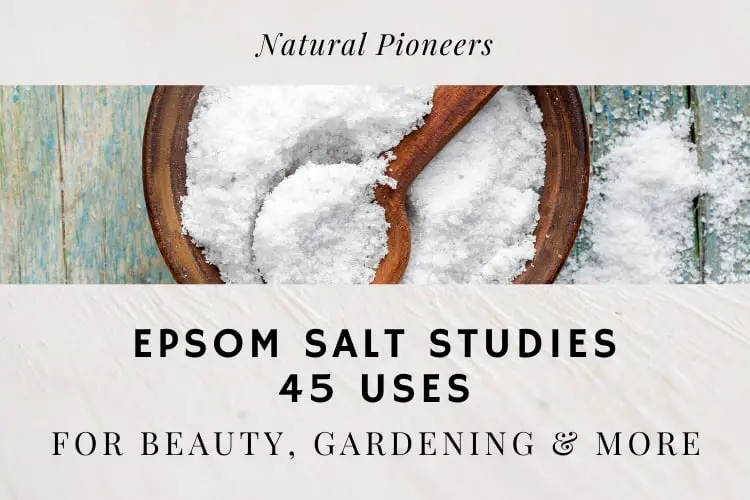
Epsom salt is a popular folk remedy and is rumored to be a cure-all in the areas of health, beauty, gardening, relaxation, and more. This article is packed with studies and will debunk 45 common beliefs about Epsom salt.
BEAUTY
1. Epsom Salt Gets Rid Of Blackheads
The Rumor: Epsom salt dislodges blackheads. It is said that a teaspoon of Epsom salt and 3 drops of iodine combined with half a cup of boiling water do the trick. You should apply this mixture to your blackheads with a cotton ball.
Scientific Proof: None
What We Think: It’s definitely worth a try. We personally prefer natural and evidence-based cosmetics. Struggling with acne? Learn what studies found when treating acne with Dead Sea mud.
2. Epsom Salt Cleanses Pores
The Rumor: Epsom salt cleanses pores. It is said that a homemade Epsom salt scrub works wonders when it comes to cleansing pores. You should combine 1 tsp of Epsom salt with 1 tsp Aloe Vera gel and a few drops of an essential oil, we like Tee Tree oil or Lavender oil. Simply scrub your face and rinse with warm water. This will give your skin a healthy glow.
Or use it together with your favorite cleanser: Mix ½ tsp of Epsom salt with your favorite cleanser, we like this natural cleanser. Gently massage into your skin, and rinse with warm water.
Scientific Proof: None
What We Think: It’s worth a shot. While there are no studies on Epsom salt as a cleanser or exfoliant, we assume that it probably works similar to any other salt. Having said that, don’t expect it to do miracles to your blackheads.
3. Epsom Salt Repairs Rough Skin Patches
The Rumor: Epsom salt repairs rough patches of knees and elbows. In order to soften up these spots, take a bath in Epsom salt with a few drops of essential oil, like lavender.
Scientific Proof: Despite the fact that the PubMed database is packed with 9280 studies on the topic of Epsom salt, no study was able to find health benefits of Epsom salt in baths.
What We Think: There are many benefits to taking a hot bath alone, but adding Epsom salt doesn’t add any benefits. You can read more about the benefits of hot baths in our article about natural bath additives. If you are looking for a salt to better your skin, Dead Sea salts are your go-to option. Its benefits are proven many, many times and it literally does miracles to our skins. If you want to read more about Dead Sea salts, click here.
4. Epsom Salt Exfoliates Skin
The Rumor: Epsom salts are used as an exfoliant in many DIY recipes. It’s crystalline structure helps remove old skin cells, leaving you with a fresh and healthy glow.
The minimalistic approach: Use ½ tbsp of Epsom salt, dampen with some drops of water, and gently massage into your skin. Wash with warm water.
Scientific Proof: None
What We Think: It really can’t hurt. Similar to salt, Epsom salt can be used as an exfoliant to remove dead skin cells and help your skin feel fresh. It’s best to use exfoliants at night before bed – not in the mornings which is the time our skin needs a little bit of extra protection.
5. Epsom Salt Reduces Cellulite
The Rumor: Epsom salt supposedly reduces water retention and breaks up fat cells that led to cellulite. For a scrub, mix 1 cup of Epsom salt with ½ cups of coconut oil and some drops of your favorite essential oil.
Scientific Proof: None
What We Think: Hanky-Panky! We do not believe this will do anything to your cellulite problem. While a scrub in general can enhance blood flow in tissues and brighten up your skin, cellulite is in most cases the result of a high body fat percentage and little muscle mass in those areas. We recommend cleaning up your diet and getting educated on insulin to combat cellulite.
6. Epsom Salt Helps With Cracked Heels
The Rumor: A foot soak in Epsom salt followed by a scrub with a pumice stone supposedly helps with cracked and flaky heels.
Scientific Proof: Science shows that there are much better bath additives than Epsom salt, which – despite 9280 studies on PubMed – still lacks fundamental proof of its imposed health benefits. Read more on Epsom salt here.
What We Think: A foot soak and a good scrub with a pumice stone is a fabulous idea. However, we’ll definitely give Epsom salt a pass and choose bath additives with proven benefits like Dead Sea salt or sea salt. Lean more about the best bath additives for dry skin here.
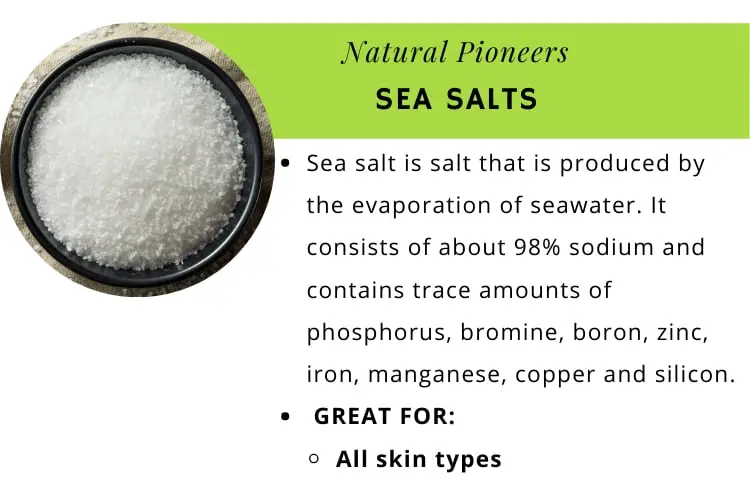
7. Epsom Salt Adds Volume To Your Hair
The Rumor: Apparently, Epsom salt can add some volume to your hair with this simple recipe: Mix ¼ cup of Epsom salt with 1 cup of water. For a crunchy curl, scrunch into your hair and store the rest in a spray bottle.
Scientific Proof: None
What We Think: It can’t hurt giving this recipe a try. We recommend watching a couple videos on the topic to make sure you know how to properly apply the salts to your hair.
8. Epsom Salt Tames Damaged Hair
The Rumor: Epsom salt is supposed to revitalize frizzy, damaged hair. For dry hair, you should add Epsom salt to your conditioner, apply all over your hair, let it soak for 2 minutes and rinse thoroughly after that. In oily hair, you should mix equal parts of shampoo and Epsom salt, apply to your hair and, after rinsing, use your favorite conditioner as usual.
Scientific Proof: None
What We Think: Quite frankly, using Epsom salt in the long run for your hair can do one of two things. It will either make it smoother, less frizzy, or it will damage it. We don’t recommend experiencing with your hair too much. A nutritious diet and a basic shampooing and conditioning regimen with natural, non-toxic products does the trick for most hair. Make sure to get your ends trimmed regularly to keep your hair healthy.
9. Epsom Salt Prevents Premature Aging
The Rumor: Epsom salt’s antioxidative properties supposedly prevent premature aging. In a moisturizer, it’s supposed to prevent fine lines and wrinkles.
Scientific Proof: None whatsoever.
What We Think: This one is a little outrageous. As long as no study can prove it (by the way, there is not even evidence for its benefits in baths) we’re definitely not going to buy into this. What if, however, we knew of a bath salt where studies can prove reduced aging signs? Curious? We’re talking about Dead Sea salts. Read more about the benefits of Dead Sea salt here.
10. Epsom Salt Banishes Bad Breath
The Rumor: It is said that Epsom salt can be used as a mouth wash. You should dissolve 2 tbsp of Epsom salt in warm water and gargle and rinse afterward.
Scientific Proof: None
What We Think: We don’t recommend using Epsom salt as a mouthwash. For one thing, Epsom salt tastes quite bitter and for another thing, studies have shown severe poisoning as a result of ingesting too much Epsom salt. Make sure you’re hydrated and keep your oral hygiene up. As a mouthwash, we recommend you stay away from Epsom salt.
11. Epsom Salt Makes A Volume-Boosting Hair Mask
The Rumor: A hair mask with Epsom salt supposedly strengthens and thickens hair. Use a natural conditioner and mix in equal parts of Epsom salt. Apply to your hair and leave in for about 15 minutes. This should leave your hair smooth and bouncy.
Scientific Proof: None
What We Think: This approach has some similarities to using Epsom salt as a conditioner to tame hair as we talked about in #8. Our take? Give it a shot. If it doesn’t work, stop using it, but if it does, great!

12. Epsom Salt Makes A Moisturizing Face Mask
The Rumor: Avocados mixed with Epsom salt makes a great exfoliant and hydrating face mask. To do so, mash a ripe avocado and stir in Epsom salt until a thick consistency is reached. Spread a thin layer to your face and gently work the exfoliating Epsom salts into your skin. Leave on until dry, about 20 min, and rinse with warm water. [1]
Scientific Proof: None
What We Think: We love this recipe! Minimal ingredients, easy to do at home, and it definitely leaves you with a refreshed, hydrated feeling afterwards.
Dealing with acne? Learn what works according to studies. Click here.
13. Epsom Salt Protects Hair From Heat Damage
The Rumor: If you treat your hair with a straightening iron or blow-dryer frequently, it gets dry quickly. Epsom salt is supposedly not only able to boost volume and tame frizz, but protects the ends of your hair from heat damage.
Scientific Proof: None
What We Think: We’re not buying into that. The only “living” part of our hair is the follicle, whereas all visible hair is considered “dead” and shows no biochemical activity. Hence, it cannot absorb nutrients or vitamins. Epsom salt is magnesium sulfate. While enough magnesium in our diet can make a difference for your hair, your hair cannot “absorb” any of Epsom salt’s magnesium when applied topically.
14. Epsom Salt Gets Rid Of Styling Buildup
The Rumor: Just like a “deep cleansing” shampoo, equal parts of Epsom salt and lemon juice mixed in some warm water may help you out. Pour the mixture over your hair and leave on for 15 minutes and then rinse out.
Scientific Proof: None
What We Think: Thumbs up! We’ve seen this work. Let us be clear though: the power lies in the lemon juice, not necessarily in the Epsom salt. Due to their citric acid content, lemons can be used to naturally lighten hair, but only hair that is light already. We definitely believe that the citric acid content can help give your hair a deep cleanse, too.
MIND
15. Epsom Salt Alleviates Stress
The Rumor: Epsom salts supposedly calms the mind. How? A bath in magnesium-rich Epsom salt allows the magnesium to enter your skin; resulting in essentially the same effects achieved by a dietary magnesium supplement: It activates mechanisms that quiet and calm you.
Scientific Proof: Repeatedly, studies cannot find evidence for this claim.
What We Think: After all the research we’ve done on bath additives, we can competently say: The magnesium in Epsom salt cannot enter your body through your skin. It just doesn’t work like that. Since Epsom salt is 100% magnesium sulfate and doesn’t contain any other beneficial minerals, it doesn’t do anything when used as a bath additive. Looking for proven beneficial bath salt? Use Dead Sea salt. Lean more here.
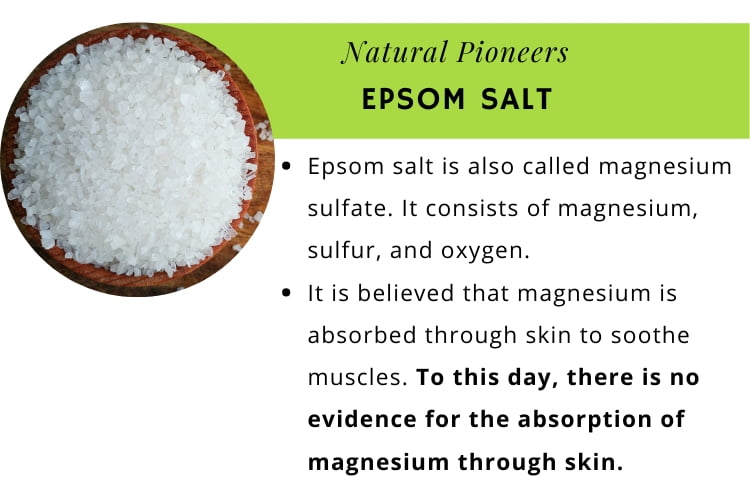
GARDENING
16. Epsom Salt Makes Your Grass Greener
The Rumor: Epsom salt supposedly helps grass become more green. To achieve this effect, add a couple of tbsp Epsom salt to your lawn watering routine.
Scientific Proof: Tests by the National Gardening Association prove Epsom salt’s benefits.
What We Think: According to the National Gardening Association, Epsom salt can improve the mineral content of your soil and shows best results in soils that are slightly deficient in magnesium. Particularly Western, Southeast, and Pacific Northwest soils.
17. Epsom Salt Encourages Plants To Grow
The Rumor: Epsom salt consists of magnesium sulfate which can nurture your soil. To achieve this, add a few teaspoons of Epsom salt to the water you use to water your plants.
Scientific Proof: Tests by the National Gardening Association prove Epsom salt’s benefits.
What We Think: Thumbs up! Mineral depleted soils will love the added nutrients and may help boost your crop yield. Take Note! Do not prepare soil where you grow sage. This herb does not like Epsom salt.
18. Epsom Salt Improves the Color of Plants
The Rumor: Epsom salt supposedly helps plants with the uptake of chlorophyll, resulting in a darker green color of leaves. To achieve this, apply 1-2 tbsp of Epsom salt per square foot of soil. Ideally, sprinkle your soil before the winter to make sure the nutrients are thoroughly absorbed by the time spring gardening tasks begin. Make sure to use much less for smaller, potted plants.
Scientific Proof: Tests by the National Gardening Association prove Epsom salt’s benefits.
What We Think: This should work! Since tests done by the National Gardening Association came back positive, we recommend you give this a try. Whether or not it results in a darker shade of green in your plants, extra nutrients won’t do any harm to your soil. Take Note! Do not prepare soil where you grow sage. This herb does not like Epsom salt.
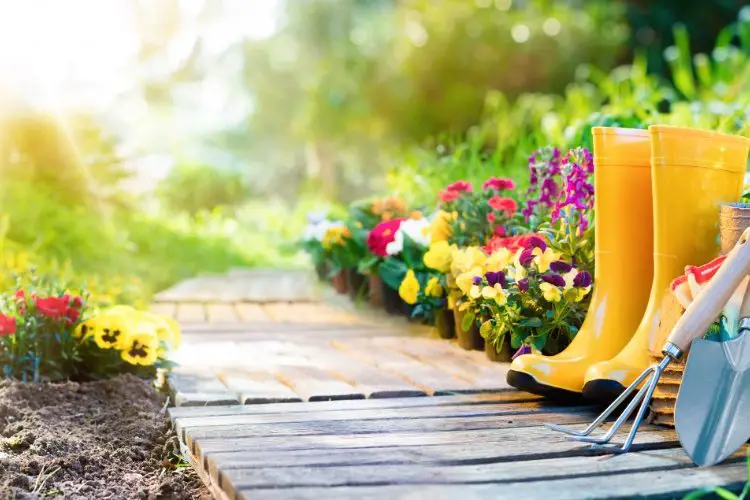
19. Epsom Salt Keeps Slugs Away
The Rumor: Sprinkling Epsom salt around your bed supposedly keeps slugs away.
Scientific Proof: None.
What We Think: Since we can’t find evidence for this claim, we recommend you give it a try yourself. If slugs keep coming, we recommend a slug fence. I have personally grown up with a garden that had slug fences, and they worked like magic against slugs.
20. Epsom Salt Increases Seed Germination
The Rumor: Epsom salt supposedly helps with germination. The additional nutrients strengthen a seed’s and plant’s cell wall leading to quicker germination overall. To achieve this, add 1 cup of Epsom salt per 100 square feet of garden once it has been tilled. It is also recommended putting some Epsom salt into each hole before dropping your seeds into the soil.
Scientific Proof: None
What We Think: While extra nutrients can definitely be of help for depleted soil, we cannot quite grasp the logic behind this statement. If you’ve decided to use Epsom salt in your soil already, you will automatically benefit from this effect – that is, if it exists.
21. Epsom Salt Works As An Insecticide
The Rumor: Epsom salt dissolved in warm water and sprayed onto your lawn and garden works as a natural insecticide spray and gets rid of plant pests.
Scientific Proof: None
What We Think: Again, give it a try if you feel like it. In some ways, it seems like the list of benefits and applicable uses is endless. Since there are no studies available, we recommend you give this a try and let us know what you found.
22. Epsom Salt Grows Larger Peppers
The Rumor: Epsom salt-treated pepper plants and fruits apparently grow larger and their fruits taste better. Some go as far as to say: “The fruits were much bigger, almost twice the size. They were juicier, sweeter, and triple the thickness of the untreated peppers.” To achieve this, combine 1 tbsp of Epsom salt with a gallon of water. Spray your pepper plants at bloom time and repeat after 10 days.
Scientific Proof: Tests by the National Gardening Association prove Epsom salt’s benefits.
What We Think: Results seem to be mixed. Overall, more than half of the testers in the study reported bigger plants and fruits. The effectiveness might depend upon your soil’s initial magnesium content.
23. Epsom Salt Grows Bigger Tomatoes
The Rumor: Magnesium deficient soil causes tomato leaves to yellow in the late season and fruit production to slow down. To make sure your soil has enough magnesium, apply 1 tbsp of granules around each transplant. Repeat at first flowering and again at fruit set.
Scientific Proof: Tests by the National Gardening Association prove Epsom salt’s benefits.
What We Think: Since the tests show, that tomato leaves actually do show a darker green color, the extra nutrition might also help your crop size and yield. Particularly those grown on depleted soils.
24. Epsom Salt Helps Your Roses Grow
The Rumor: Epsom salt applied to roses helps them grow. One tester reported that the treated roses had greener foliage and bigger flowers with deeper colors. According to the National Gardening Association, many rosarians agree, that Epsom salt-treated plants produce more new canes at the bottom of the plant (bottom breaks) and darker green foliage. It is recommended to apply ½ a cup in the spring before the buds open and then again in the fall before the leaves drop.
Scientific Proof: Tests by the National Gardening Association prove Epsom salt’s benefits.
What We Think: When it comes to roses, Epsom salt shows proven benefits. This is definitely worth a try!

25. Epsom Makes Fruit Sweeter
The Rumor: Epsom salt provides nutrients that make fruit taste sweeter. Even commercial growers have supposedly used it since it reduces the overall amount of fertilizer needed. To achieve this, mix some Epsom salt in water and water your trees.
Scientific Proof: Tests by the National Gardening Association prove Epsom salt’s benefits.
What We Think: It has worked in peppers, so why not in fruit trees. We like it!
26. Epsom Salt Helps Shrubs Grow
The Rumor: Nutrients in Epsom salt help shrubs grow. As in the aforementioned gardening tips, Epsom salt provides nutrients for a better soil. Here’s what to do: Apply 1 tbsp per 9 square feet over the root zone of your trees. Repeat every 3 weeks.
Scientific Proof: Tests by the National Gardening Association prove Epsom salt’s benefits.
What We Think: Tests show positive effects for roses, peppers and tomatoes, so why not shrubs? If your soil lacks magnesium, this is definitely worth a shot.
27. Epsom Salt Helps Trees Grow
The Rumor: Nutrients in Epsom salt nourish depleted soils and help trees grow. To achieve this, use 2 tbsp per 9 square feet diluted in water. It is recommended to apply the solution 3 times a year.
Scientific Proof: Tests by the National Gardening Association prove Epsom salt’s benefits.
What We Think: Need your trees to grow faster? Help them out by adding some nutrients to their soil. It can’t hurt and shows proven effects in tomatoes, peppers, and roses.
28. Epsom Salt Helps House Plants Grow
The Rumor: House plants need some extra attention and nutrients since they are caught inside and don’t have access to nature’s bounty of nutrients. You help them by adding 2 tbsp of Epsom salt per gallon of water.
Scientific Proof: Tests by the National Gardening Association prove Epsom salt’s benefits.
What We Think: You house plants definitely deserve some tender loving care. Help them out with some Epsom salt which shows proven benefits in tomatoes, peppers and roses.
HEALTH
29. Epsom Salt Helps With Sore Muscles
The Rumor: A warm bath in Epsom salt relieves body aches. Especially popular among runners and sports people, Epsom salt supposedly relieves sore muscles. 1 cup added to your bath should do the trick.
Scientific Proof: Repeatedly, studies cannot find evidence for this claim.
What We Think: Epsom salt is magnesium sulfate. Repeated studies have proven, that Magnesium cannot enter our body through our skin. There are far better, and clinically proven bath salts available that actually offer a lot of benefits for our skin, certain diseases and overall health. Curious about what really works? Read more in our Quick And Easy Guide To Bath Salts.
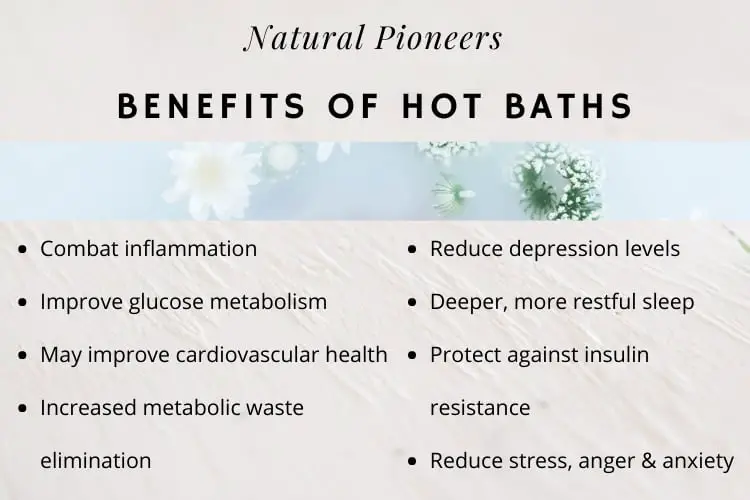
30. Epsom Salt Helps With Tired Feet
The Rumor: A Foot soak in Epsom salt is supposed to help tired feet feel refreshed again. 1 cup dissolved in a large bucket does the trick.
Scientific Proof: Studies cannot find evidence for this claim.
What We Think: Just like hot baths, foot soaks have a lot of benefits by themselves without any added salts. Read more about the benefits of hot baths here. Since science cannot find any benefits of Epsom salt added to baths or soaks, we highly recommend you use a bath salt that really works. Read more about the evidence-based health benefits of natural bath additives here.
31. Epsom Salt Helps Relieve Headaches
The Rumor: Soaking in a bath with 1 cup of Epsom salt supposedly relieves headaches.
Scientific Proof: None, whatsoever.
What We Think: Hot baths have a lot of health benefits. You can read more about its benefits here. It’s important to understand, however, that studies on Epsom salt cannot find any health benefits. Be that headache relief, soothing sore muscles, or magnesium boosting effects. If a hot bath helps you with headaches, try a clinically proven bath salt that you can find in our article here.
32. Epsom Salt Eases Discomfort Of Gout
The Rumor: Baths in Epsom salts supposedly ease gout symptoms. Inflammation markers are reduced by adding 3 tsp of Epsom salt into a basin and immersing your affected joint.
What We Think: We repeat ourselves, but it’s important to understand that Epsom salt has no health benefits when added to baths, according to studies. Hot water alone has lots of proven benefits, including the reduction of inflammation markers. Read more about the benefits of hot baths and good bath salts here.
33. Epsom Salt Relieves Bug Bites
The Rumor: 2 tbsp of Epsom salt dissolved in water supposedly relieve bug bites.
What We Think: Since science can’t give us an answer here, go try it out yourself. If it works, great! If not, there are tons of natural remedies on the market.
34. Epsom Salt Relieves Sunburn
The Rumor: 2 tbsp of Epsom salt in 1 cup of water sprayed on affected areas is supposed to help relieve sunburn.
Scientific Proof: None.
What We Think: Epsom salt is a popular folk remedy. Despite its long history, it’s sunburn healing properties are one of many empty claims. Science cannot find evidence for it.
35. Epsom Salt Helps With Bruises
The Rumor: Cold water mixed with Epsom salt helps bruises heal faster. To achieve this effect, soak the mixture up with a washcloth and apply to the bruise.
Scientific Proof: Studies cannot find evidence for this claim.
What We Think: While cold water can definitely cool a bruised area, there is no evidence for Epsom salt to help it any further. According to studies, Epsom salt’s magnesium cannot be absorbed through our skin.
36. Epsom Salt Helps Remove Splinters
The Rumor: Soaking the affected area in ⅓ cup of Epsom salt dissolved in 1 cup of water supposedly helps remove splinters.
What We Think: While a soak in warm water can definitely help loosen up the area around the splinter, there is no evidence that Epsom salt can help in this process.
37. Epsom Salt Helps You Sleep Better
The Rumor: Taking a bath in Epsom salt helps adults and kids sleep better at night. Add 1 cup of Epsom salt to your bath water to achieve this effect.
What We Think: Sometimes, things get confused. When we should praise the hot water itself for these benefits, we accidentally gave all the fame to Epsom salt. Studies show that hot baths help you sleep better. Even more so, when essential lavender oil is added. In the case of Epsom salt, however, there is no evidence for health benefits. [2]; [3]
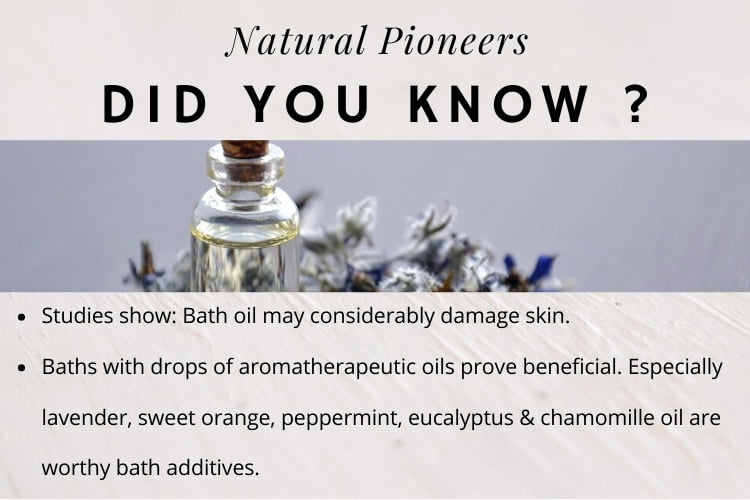
38. Epsom Salt Helps With Postnatal Recovery
The Rumor: Soaking in warm Epsom salt is used to relieve inflammation, burning, itching and pain of anal fissures, and stitches after childbirth.
What We Think: This is a deeply medical topic that you should definitely discuss with your doctor first. As far as we can tell, there are effective and healing bath additives available. Epsom salt is NOT one of them. You can read more about natural bath additives here.
39. Epsom Salt Baths Help With Overall Health
The Rumor: Soaking in a tub of hot water and 1 cup of Epsom salt can help with overall health. The magnesium in Epsom salt will be absorbed through your skin.
Scientific Proof: Studies cannot find evidence for this claim.
What We Think: Again, things have gotten confused here. Studies show, that hot baths are a proven method to increase overall health parameters. You can read more about hot bath benefits here. Epsom salt on the other hand comes with no health benefits whatsoever. And studies show, that magnesium cannot be absorbed through our skin – it just doesn’t work that way. While we love natural remedies, you’re much better off using a natural bath additive that works! You can find our Quick Bath Guide here.
40. Epsom Salt Removes Foot Odor
The Rumor: Soaking your feet in Epsom salt supposedly removes bad odor.
What We Think: While soaking your feet can definitely help with odor, the added Epsom salt doesn’t do anything. Studies show, that Epsom salt has no health benefits. Instead, try some Dead sea salt. Simple and proven effective. Read more about Dead Sea salt and other natural bath additives here.
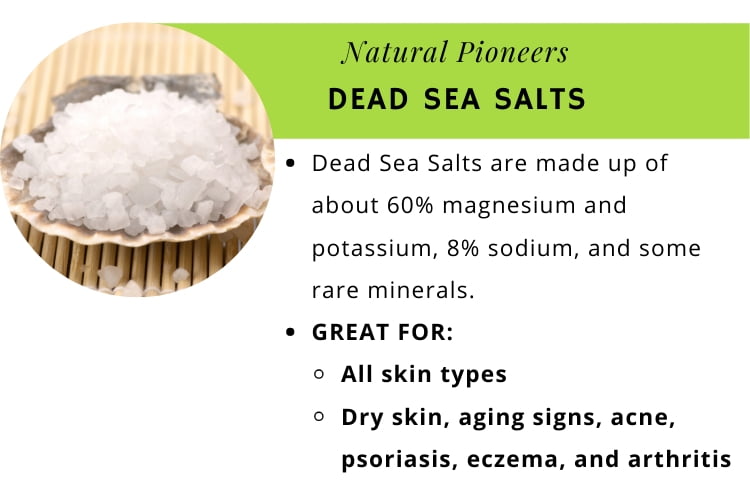
41. Epsom Salt Relieves Constipation
The Rumor: Taking Epsom salt orally is supposed to help with constipation.
Scientific Proof: Caution! Studies have shown serious poisoning.
What We Think: While it is prescribed by doctors, Epsom salt is nothing that should be taken without prior consultation with your healthcare provider.
HOME
42. Epsom Salt Makes A Great Fabric Softener
The Rumor: 2 tablespoons of Epsom salt added to a load of laundry do the trick!
What We Think: With no studies available we recommend you give this a try yourself. You might want to use less delicate clothing to avoid any damage.
43. Epsom Salt Cleans Dirty Tiles
The Rumor: Simply mix equal parts of dish detergent with Epsom salt and use the granules as a scrub on our dirty tile.
Scientific Proof: None.
What We Think: Just like any other salt or crystalline substance this should work! Go roll your sleeves up and scrub away. Your tiles will look like new!
44. Epsom Salt Cleans Washing Machines
The Rumor: Built-up detergent residue in your washing machine can be cleaned with an agitate – soak – agitate cycle with 1 cup of Epsom salt.
What We Think: We strongly recommend consulting your machine’s instruction manual or customer support before you throw any Epsom salt into your machine.
45. Epsom Salt Makes A Merry Window Frosting
The Rumor: If you’re looking for the Christmassy frosted-window look, make use of Epsom salts! Mix 1/2 cup of boiling water with 1 cup of Epsom salt and 3 tbsp dish soap. Use a clean sponge and start dabbing it onto your windows. Once your creation has dried, you’ll have salty, frosty windows!
What We Think: We’ve tested it – and it works! While it definitely requires a little practice, Epsom salt makes a great frosting for the holiday season.

